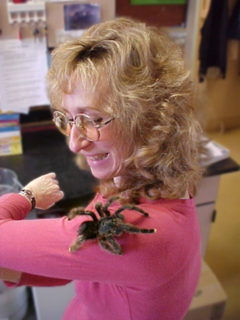A Quote by Bruce H. Lipton
Humans are more dependent on learning for survival than other species,We have no instincts that automatically find us food and shelter !
Related Quotes
Food production has affected the environment more than any other activity humans have engaged in. Humanity devotes more land to food production than anything else - roughly a third of the surface area of the earth, much of which was once forest but has been converted by humans into farms or grazing lands.
It was not that I disliked people; some of them were interesting and kind. But even the nice ones were no more compelling or important to me than other creatures. Then, as now, to me humans are but one species among billions of other equally vivid and thrilling lives. I was never drawn to other children simply because they were human. Humans seemed to me a rather bullying species, and I was on the side of the underdog.
We have restricted humans from giving 'free' food to bears and dolphins because we know that such feeding would make them dependent and lead to their extinction. But when it comes to our own species, we have difficulty seeing the connection between short-term kindness and long-term cruelty; we give women money to have more children, making them more dependent with each child and discouraging them from developing the tools to fend for themselves. The real discrimination against women, then, is 'free feeding'.
Without birds to feed on them, the insects would multiply catastrophically. The insects, not man or other proud species, are really the only ones fitted for survival in the nuclear age. The cockroach, a venerable and hardy species, will take over the habitats of the foolish humans, and compete only with other insects or bacteria.
We humans, once we have become emotionally invested in a homeplace, a prized personal possession, or, especially, in another person, find it immensely difficult to give them up....Because they were made at a time of life when we were utterly dependent on them, the love attachments of infancy have inordinate power over us, more than any other emotional investment.
This food-and-shelter theory concerning man's efforts is without insight. Our most persistent and spectacular efforts are concerned not with the preservation of what we are but with the building up of an imaginary conception of ourselves in the opinion of others. The desire for praise is more imperative than the desire for food and shelter.
Must whales and dolphins be subjected to deafening noise that will cause more than 3.5 million instances of temporary and/or permanent hearing loss? For species that depend on hearing for survival - to find food, migrate, and communicate - any hearing loss could be catastrophic. As one scientist noted, a deaf whale is a dead whale.
'Extinction' issue. Save the species for whom??? Humans' convenience, of course! Individuals of the species are snatched from their homes/family/habitat/held in captivity/forced to mate at great physical/ spiritual pain. When the right numbers are reached, their holocaust starts all over again! Another merry-go-round/ bu$ine$$ a$ u$ual!!! Protectionists/welfarists find it a profitable issue: no controversy/ easy donations! I'd rather see an entire species extinct than in the hands of the humans!
To our human minds, computers behave less like rocks and trees than they do like humans, so we unconsciously treat them like people.... In other words, humans have special instincts that tell them how to behave around other sentient beings, and as soon as any object exhibits sufficient cognitive function, those instincts kick in and we react as though we were interacting with another sentient human being.
It is an odd fact of evolution that we are the only species on Earth capable of creating science and philosophy. There easily could have been another species with some scientific talent, say that of the average human ten-year-old, but not as much as adult humans have; or one that is better than us at physics but worse at biology; or one that is better than us at everything. If there were such creatures all around us, I think we would be more willing to concede that human scientific intelligence might be limited in certain respects.
Humans are particularly interesting; our culture is incredible, there's no doubt about that. In many respects, no other species matches ours. But in quite a few respects, they do, and that can help us, perhaps, to better understand our own culture. We look at the ways humans are similar to other animals, and at the ways they differ, rather than just saying, "We have culture and you don't."


































